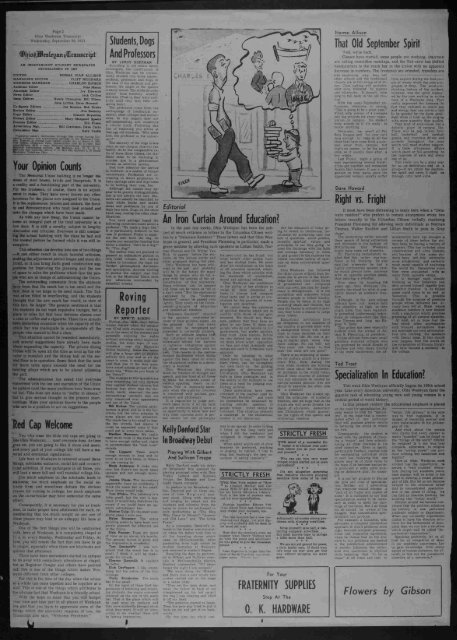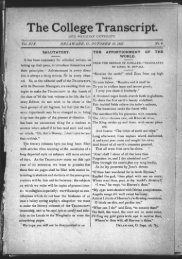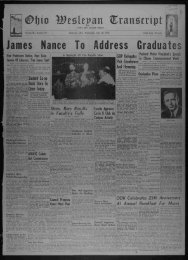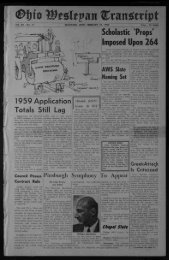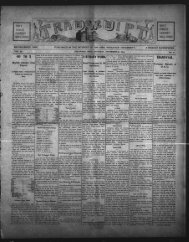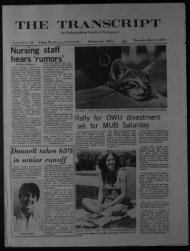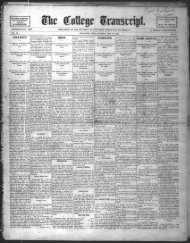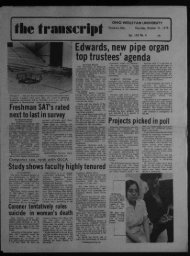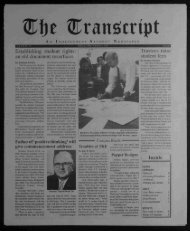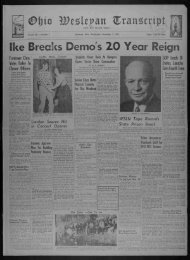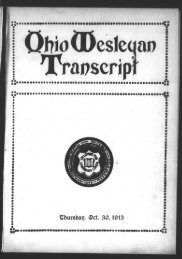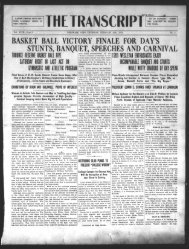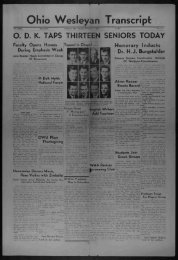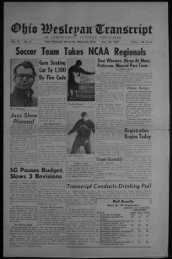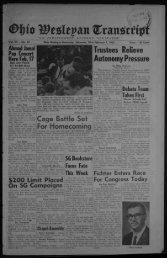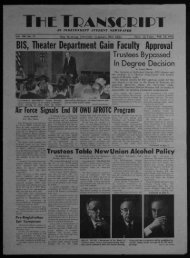tpum i - OWU DRC Home - Ohio Wesleyan University
tpum i - OWU DRC Home - Ohio Wesleyan University
tpum i - OWU DRC Home - Ohio Wesleyan University
You also want an ePaper? Increase the reach of your titles
YUMPU automatically turns print PDFs into web optimized ePapers that Google loves.
Page 2<br />
<strong>Ohio</strong> <strong>Wesleyan</strong> Transcript<br />
Wednesday, September 26, 1951<br />
AN INDEPENDENT STUDENT NEWSPAPER<br />
ESTABLISHED IN 1867<br />
EDITOR NORMA JEAN ALLISON<br />
MANAGING EDITOR CLIFF REICHARD<br />
BUSINESS MANAGER<br />
. Assistant Ediior<br />
'Associate Editor<br />
News Editor<br />
Issue Editors Nancy<br />
CHARLOU RIPSCH<br />
Pete Mason<br />
Joy Edwards<br />
Jack Collins<br />
Champion, Bill Elbon,<br />
Jane Litiick. Dave Howard<br />
Co-Sports<br />
Editors<br />
Joe Somma, Bob Drake<br />
Society Ediior Ros Seabury<br />
Copy Editor Eleanor Bryenton<br />
Picture Editor Mary Margaret Speers<br />
Feature Editor Bill Klann<br />
Advertising Mgr. Bill Creviston, Dave Carlo<br />
Circulation Mgr. Gary Castle<br />
Published weekly. September through Mav except during <strong>University</strong><br />
holidays and examination periods, at the Delaware Gazette.<br />
Entered as second class matter, under Act of March 8 1897<br />
Post Oftjce, Delaware, <strong>Ohio</strong>. Subscription rate S3 a year- - maii<br />
subscriptions. S3.50 a year. National advertising representative<br />
National Advertising service, 420 Madison ave., N. Y., N Y<br />
Editorial and business offices, P. O. Box 364, Quonset 5, 70 South<br />
Sandusky, Delaware, <strong>Ohio</strong>.<br />
Your Opinion Counts<br />
The Memorial Union building is no longer the<br />
scene of steel beams, bricks and blueprints. It is<br />
a reality and a functioning part of the university.<br />
For the freshmen, of course, there is no adjustment<br />
to make. They have never known any other<br />
.locations for th places now assigned to the Union.<br />
It is the sophomores, juniors and seniors, th faculty<br />
and Administration who must look around and<br />
note the changes which have been made.<br />
As with any new thing, the Union cannot become<br />
an integral part of the total university in a<br />
few days. It is still a novelty, subject to lengthy<br />
discussion and criticism. Everyone is still comparing<br />
the actual building with the ideas he had and<br />
the mental picture he formed while it was still incomplete.<br />
This situation can develop into one of two things<br />
it can either result in much harmful criticism,<br />
making the adjustment period longer and more difficult,<br />
or it can bring forth good constructive suggestions<br />
for improving the planning and the use<br />
of space to solve the problems which face the people<br />
who are in charge of administering the Union.<br />
The outstanding comments from the students<br />
have been that the snack bar is too small and the<br />
first floor is too large to be used much. The Tub<br />
was often filled to overflowing, and the students<br />
thought that the new snack bar would, in view of<br />
this fact, be larger. The general sentiment is that<br />
the students do not want expansive lounges, but a<br />
place to relax for that hour between classes over<br />
a coke or coffee and a cigarette. There have already<br />
been numerous occasions when the capacity of the<br />
snack bar was inadequate to acommodate all the<br />
people who wanted to find a chair.<br />
"" This situation cannot be remedied immediately,<br />
and several suggestions have already been made<br />
about expanding the capacity. The private dining<br />
"rooms will be open all the time as soon as the elevator<br />
is installed and the dining hall on the second<br />
floor is in operation. Some think that the need<br />
for more table space exceeds the need for the<br />
bowling alleys which are to be placed adjoining<br />
the grill.<br />
" The administration has asked that everyone<br />
concerned with the use and operation of the Union<br />
he patient until the many problems have been ironed<br />
out. This does not mean to "suffer in silence,"<br />
but to give serious thought to the present shortcomings.<br />
Make your opinions known to the people<br />
w ho are in a position to act on suggestions.<br />
Red Cap Welcome<br />
You who wear the little red caps are going to<br />
; like <strong>Ohio</strong> <strong>Wesleyan</strong> . . . most everyone does. As time<br />
goes on, you are going to like it more and more;<br />
and every part of your college life will have a material<br />
and emotional significance.<br />
Life here at <strong>Wesleyan</strong> is centered around three<br />
things; scholastic endeavor, social life and co-curri-cu-<br />
activities. If you participate in all three, you<br />
will lead a more full and well rounded college life.<br />
JToo much emphasis on the scholastic leads to<br />
staleness; too much emphasis on the social detracts<br />
from and sometimes defeats the obvious<br />
reason for coming to college; too much emphasis<br />
on the co-curricu-<br />
lar may<br />
lar<br />
have somewhat the same<br />
effect.<br />
Consequently, it is necessary for you as fresh- -<br />
men, to make proper time allotments for each, remembering<br />
that too much weight on any one of<br />
these phases may lead to an unhappy life here at<br />
<strong>Wesleyan</strong>.<br />
One of the first things you will be confronted<br />
with, here at <strong>Wesleyan</strong>, is a compulsory chapel at<br />
1 1 a. m. every Monday, Wednesday and Friday. At<br />
first, you will resent the fact that you have to go<br />
to chapel, especially when there are bluebooks and<br />
quizzes that afternoon.<br />
There have been movements started on campus<br />
to do away with compulsory attendance at chapel,<br />
but as Registrar Conger and others have pointed<br />
out, ths is one of the things which makes <strong>Wesleyan</strong><br />
different from other colleges.<br />
For this is the time of the day when the school<br />
as a whole can corne together and be together as a<br />
unit. This is one of the things which attributes to<br />
the obvious fact that <strong>Wesleyan</strong> is a friendly school.<br />
With the hope in mind thai you will budget<br />
your time and take part in all phases of <strong>Wesleyan</strong><br />
life and that you learn to appreciate some of the<br />
things which the university requires of you, the<br />
Transcript also says, "Welcome Freshmen."<br />
Students, Dogs<br />
And Professors<br />
BY LEROY HOFFMAN<br />
According to the senior bench<br />
sociologists, the constituency of<br />
<strong>Ohio</strong>, <strong>Wesleyan</strong> can be conveniently<br />
divided into three classes:<br />
students, professors and dogs. In<br />
the case of the students and professors,<br />
the origin of the species<br />
is easily traced. The students come<br />
mainly from formerly wealthy<br />
families. (That is, they were<br />
well-to-d- o<br />
until they sent their offspring<br />
here.)<br />
The professors come from the<br />
well-sprin- gs of<br />
intellectual en-<br />
deavor, other colleges and universities.<br />
In this respect they are<br />
self-perpetuati- ng and constitute<br />
a vicious circle. Following this<br />
line of reasoning you arrive at<br />
that age old dilemma, "Who came<br />
first, the professor or the university?"<br />
The ancestry of the dogs is less<br />
clear, as any campus observer can<br />
testify. As to the comparative ratio<br />
of these three classes, the students<br />
seem to be declining in<br />
number due to a phenomenon<br />
known as selective service.<br />
Just how selective the service<br />
is, however, is a matter of violent<br />
controversy. Professors are increasing<br />
in direct proportion to<br />
baby carriage sales and dogs seem<br />
to be holding their own, too.<br />
Although the classes may appear<br />
to be plainly distinguishable,<br />
this is not always the case. Students<br />
can usually be identified by<br />
their white bucks and saddle<br />
shoes and professors by one of<br />
their two suits. Dogs, on the other<br />
hand, may overlap the other classifications.<br />
You have perhaps heard the<br />
following comments made about a<br />
professor: "He leads a dog's life."<br />
It is particularly difficult in the<br />
case of professor Postle to separate<br />
the man from the dog. Or<br />
maybe you remember hearing this<br />
about a student: "Isn't he a dog?"<br />
Or "You dog!"<br />
The author does not pretend to<br />
present an exhaustive picture in<br />
this brief column, but merely<br />
wishes to introduce the topic for<br />
further philosophical discussion<br />
and speculation. Anyone wishing<br />
to pursue the subject may find<br />
him in the Memorial Union most<br />
any afternoon surrounded by<br />
beautiful women.<br />
Roving<br />
Reporter<br />
BY ANK'T. SCRIPT<br />
During lhe . Jew days before<br />
classes started when the campus<br />
was filled with students catching<br />
up on the news of the summer and<br />
generally enjoying the sights<br />
without worrying about neglected<br />
studies, the main topic of conversation<br />
was the Memorial<br />
Union building. Sinoe-th- e union<br />
will play a large' part in student<br />
activity this year and in all the<br />
years to come, it seems only natural<br />
that one of the first questions<br />
asked among groups of students<br />
was, "What do you think of<br />
the Union?"<br />
The answers to this question are<br />
very interesting, not only because<br />
they express student opinion, but<br />
because they show that the students<br />
really observed, the new<br />
surroundings carefully and are<br />
very concerned over appearance<br />
and use of the Union.<br />
Bill Kuhner.The outside architecture<br />
is good, and so is the furniture,<br />
but the color schemes in<br />
some places are not attractive.<br />
The snack bar is too small to handle<br />
the crowds, but maybe it<br />
could be expanded some if they<br />
could put in some more tables.<br />
Marilyn Newman: We really<br />
need more room in the snack bar<br />
to have enough tables and chairs<br />
to accommodate the "rush hour"<br />
crowds.<br />
Jim Lipperfc There aren't<br />
enough women in here and no<br />
room to sit with them, so there's<br />
no use coming in.<br />
Hank Anderson: It looks very<br />
nice, but there's too much space<br />
upstairs and not enough downstairs.<br />
Joanne Plank: The decorations<br />
apparently have no continuity. I<br />
think the snack bar is too small.<br />
More chairs would help.<br />
Tom Seldon: The cafeteria is a<br />
little small, but the rest is spacious.<br />
It would help distribute the<br />
crowd if we could have an upstairs<br />
refreshment bar.<br />
Shirley Culp: It's the most wonderful<br />
place I ever saw.<br />
Helen Simester: The entire<br />
building seems to have been very<br />
poorly planned for effective use<br />
of the Union.<br />
Dale Renner: From my point<br />
of view as an alu:m, it's terrific.<br />
The general layout is good, and<br />
the impression is wonderful.<br />
Tom Gerslacker: I was surprised<br />
that the snack bar is so<br />
small. I think it will be inadequate<br />
for crowds.<br />
Eleanor Gammill: It couldn't<br />
be better.<br />
Dick Davenporl: I like everything<br />
but the colors of the furnishings.<br />
Voiiy Bun.U.k.: The snack<br />
bar is too small.<br />
On the basis of these first impressions<br />
of incoming and returning<br />
students, the major comment<br />
centered on the size of the snack<br />
bar. That is the place which will<br />
be used most by students and<br />
they have evidently thought about<br />
what they want. It will be interesting<br />
to see whether these will<br />
be lasting impressions.<br />
Editorial<br />
P<br />
I<br />
Kelly Danford Star<br />
In Broadway Debut<br />
Playing With Gilbert<br />
, And Sullivan Troupe<br />
Kelly Danford made his debut<br />
on Broadway this summer by<br />
playing principal roles with New<br />
York's Gilbert and Sullivan<br />
troupe, the Masque and Lyre<br />
Light Opera company.<br />
In preface to his Broadway debut,<br />
Danford put in three seasons<br />
of new England summer<br />
stock. Along with dancing<br />
and singing he swept out the<br />
chickens and cobwebs from the<br />
barns in which he performed in<br />
such productions as "The Man<br />
Who Came to Dinner," "Arsenic<br />
and Old Lace," and "The Little<br />
Foxes."<br />
As a youngster, Danford's interest<br />
in the theater was stimulated<br />
when his father took him to<br />
all the traveling shows which<br />
came to McConnelsville. After<br />
graduating from high school he<br />
studied dramatics at <strong>Wesleyan</strong><br />
and received a master's degree.<br />
Recalling the days he performed<br />
in Gilbert and Sullivan musicals<br />
in McConnelsville district,<br />
Danford commented, "I'll never<br />
forget the night I was scalped,"<br />
"We were doing the 'Mikado'<br />
and there was a part where two<br />
coolies carried me on- - the stae<br />
in a sedan chair.<br />
"They set the chair down, and<br />
when the fellow in back of rue<br />
straightened up, his hat caught<br />
the wig I was wearing and lifted<br />
it off my head.<br />
"The audience started to laugh.<br />
Then the poor guy tried to put it<br />
back on me and got it on backwards.<br />
"By this time the whole cast.<br />
y i<br />
An Iron Curtain Around Education!<br />
In the past few weeks, <strong>Ohio</strong> <strong>Wesleyan</strong> has been the subject<br />
of much criticism in letters to the Columbus Citizen written<br />
by a "Delaware Resident." These letters said that <strong>Ohio</strong> <strong>Wesleyan</strong><br />
in general, and President Flemming in particular, made a<br />
grave mistake by allowing such speakers as Lillian Smith, Nor-<br />
man Thomas and Dr. Walter Van<br />
Kirk to appear before the students<br />
on the lecture series and .<br />
other programs during the year.<br />
<strong>Ohio</strong> <strong>Wesleyan</strong> has been criticized<br />
in the past and probably<br />
will be in the future for many<br />
things by people who do not a-gr-<br />
with the policies of the administration<br />
of this university.<br />
Some criticism can be ignored<br />
and some can be taken as "all in<br />
a day's work." But the sentiments<br />
expressed by the "Delaware<br />
Resident" cannot be passed over<br />
lightly. They touch on the funda- - '<br />
mental principles of education<br />
and intellectual freedom.<br />
"Delaware Resident" objected'<br />
to the speakers mentioned because<br />
of their political views on<br />
the grounds that such views<br />
should not be recognized and<br />
presented to university students.<br />
Such an attitude implies thit<br />
this individual has retreated intellectually<br />
behind the barriers<br />
of righteous indignation against<br />
all whose ideas conflict with his<br />
own. This results in the narrow<br />
minded intolerance which works<br />
against the basic ideas on which<br />
the educational system in a democracy<br />
is founded.<br />
<strong>Ohio</strong> <strong>Wesleyan</strong> has always<br />
stood for freedom of thought and<br />
speech, and has tried at all times<br />
to make the students aware of<br />
various opposing views on all<br />
topics. This is especially necessary<br />
when the question involved<br />
is concerned with politics, government<br />
and philosophy.<br />
It is impossible to judge anyone's<br />
ideas fairly if all the facts<br />
are not presented and if there is<br />
no opportunity to know how and<br />
why other opinions arise. A person<br />
cannot call one philosophy<br />
ee<br />
his own until he has found out<br />
what beliefs other people have<br />
and has studied them. He must<br />
draw his conclusions on the basis<br />
of all available material, selecting<br />
the ideas which coincide with<br />
his standards of intellectual,<br />
moral and spiritual values.<br />
<strong>Ohio</strong> <strong>Wesleyan</strong> has confidence<br />
in the ability of her students to<br />
weigh all facts presented to<br />
them, to discuss and compare<br />
these facts, and to arrive at conclusions<br />
by the process of investigation<br />
and selection.<br />
We cannot deny the existence<br />
of political theories which are in<br />
conflict with those of our government.<br />
We should not, therefore,<br />
pretend that they have no<br />
place in our lives. If there are<br />
people who do not believe in cur<br />
government, but prefer another,<br />
they must have reasons. Before<br />
we can defend our own beliefs,<br />
we must know what opposition<br />
we face and what standards and<br />
values are used to formulate such<br />
opinions.<br />
Only by listening to what<br />
others have to say, regardless of<br />
their views, can we strengthen<br />
our own faith in the guiding<br />
principles of democracy and<br />
Christianity. <strong>Ohio</strong> <strong>Wesleyan</strong> has<br />
faith in these principles and in<br />
the ability of her students to use<br />
them as a basis for judging conflicting<br />
policies.<br />
Other universities have been<br />
criticised in the manner used by<br />
"Delaware Resident" and have<br />
let themselves be weakened by<br />
limiting outside speakers to<br />
people whose views cannot be<br />
criticized. This situation presents<br />
a challenge to the educational<br />
system in our democracy.<br />
was in an uproar. In order to sing<br />
I lifted up the long curls and<br />
when I did, the conductor just<br />
collapsed in chagrin over his<br />
stand."<br />
When asked which end of show<br />
business he preferred, teaching<br />
or singing, he replied, "I like to<br />
sing, but teaching's the best insurance<br />
of eating regularly!"<br />
I STRICTLY<br />
FRESH<br />
i'T'HE New York author of "How<br />
I to Commit Murder and Get<br />
Away With It" got a life sentence<br />
for his fourth felony--- a robbery.<br />
Such is the fate of modern man<br />
over-specializati- on.<br />
and his<br />
i<br />
Fashion headline: Elbows Tell<br />
Tales About Your Age. Sometimes<br />
they reveal your manners, too.<br />
i<br />
i The coal business has a new mechanical<br />
coal digger, but gold digging<br />
will probably still be done in<br />
the same old way.<br />
Now that the election's over, we<br />
wonder what Henry Wallace will<br />
do with the peace and abundance<br />
he was going to give the American<br />
people.<br />
Lake Superior is larger than the<br />
state of South Carolina, one newspaper<br />
notes. V'pltpr. too!<br />
Are the educators of today going<br />
to revert to intellectual isolationism<br />
by presenting only one<br />
side of questions about politics,<br />
morality, spiritual values and<br />
principles; or are they going to<br />
meet the challenge with the faith<br />
and courage necessary to listen<br />
to and present to the students the<br />
widest available variety of opinions<br />
on these controversial questions?<br />
<strong>Ohio</strong> <strong>Wesleyan</strong> has followed<br />
the latter course without fear, because<br />
she is secure in the knowledge<br />
that each time other forms<br />
of government are compared<br />
with our own, the case for democracy<br />
is strengthened. It is the<br />
mysterious and unknown which<br />
attracts people to follow blindly.<br />
People can be taken in by high<br />
sounding1 ideals and theories, but<br />
once the theory is reduced to practice,<br />
they have a chance to judge<br />
more wisely.<br />
Educational institutions have<br />
an obligation to the students of<br />
our country to provide them with<br />
a background which will enable<br />
them to make decisions on their<br />
own in later life. No one is<br />
go-.in- g<br />
to shelter them when they<br />
leave college. No one will say<br />
"You must not listen to that<br />
man his ideas are not good."<br />
There is no screening of speakers<br />
for mature adults in a democracy.<br />
Why, then, during the<br />
time when students are forming<br />
4heir ideas about the fundamental<br />
problems in the world today,<br />
should their sources of information<br />
and education be limited by<br />
narrow-minde- d persons who are<br />
afraid to examine the other side<br />
of a question?<br />
<strong>Ohio</strong> <strong>Wesleyan</strong> has always upheld<br />
the principles of academic<br />
freedom, and we hope that in the<br />
future she will never forsake the<br />
ideals of education, democracy<br />
and Christianity which guarantee<br />
the rights of free speech and<br />
intellectual freedom.<br />
1 jaywalkers?<br />
STRICTLY FRESH<br />
THE secret of ya successful flli-- L<br />
buster is to exhaust your audience<br />
before you do your subject<br />
and yourself.<br />
Who can say how very many<br />
winged angels started out as mere<br />
'<br />
It's not altogether surprising<br />
that feminine fashion's plunging<br />
neckline finds some of its most<br />
enthusiastic advocates among gentlemen<br />
with plunging waistlines.<br />
Move yourself; save half, a van-renti- ng<br />
company advertises. . . .<br />
But most movers hope to salvage<br />
a little more than half.<br />
We are not yet geared for peace,<br />
a farm leader says. If that's true,<br />
let's hope we may soon get that<br />
way without stripping too many<br />
gears.<br />
ForYour<br />
FRATERNITY SUPPLIES<br />
Stop At The<br />
0. K. HARDWARE<br />
'<br />
Norma Allison<br />
That Old September Spirit<br />
Well, we're back.<br />
Classes have started, some people are studying, chairmen<br />
are calling committee meetings, and the Tub crew has shifted<br />
headquarters to the snack bar in the Union with no apparent<br />
decrease in numbers. The freshmen are oriented, transfers are<br />
still explaining why they left<br />
other schools and the traditional<br />
chapels are in full swing as of today.<br />
Class cutting will probably<br />
start soon, followed by quizzes<br />
and bluebooks. It doesn't take<br />
long to fall back in the old routine.<br />
With the usual September enthusiasm,<br />
everyone is saying,<br />
"This is going to be a great year."<br />
Filled with visions of 4 averages<br />
and big projects lor every organization<br />
on campus, the student<br />
body sounds as if it's ready to<br />
tackle anything.<br />
Obviously, we aren't all Phi<br />
Beta Kappas and the year isn't<br />
long enough to take in all the<br />
ideas that have come from a summer<br />
away from campus, but<br />
that's no reason to let the spirit<br />
slide, as it usually does after a<br />
few weeks.<br />
Last Friday night a group of<br />
men representing several fraternities<br />
got together and serenaded<br />
Austin Hall women. It was a nice<br />
gesture on their parts, since the<br />
upperclass women usually suffer<br />
Dave Howard<br />
Right vs. Fright<br />
from neglect during the first couple<br />
of weeks while the men congregate<br />
at Stuy. The most outstanding<br />
feature of the incident,<br />
however, was the spirit displayed<br />
by the men arching in to the<br />
tune of a <strong>Wesleyan</strong> song. They<br />
really impressed the listeners. In<br />
fact they radiated so much pep<br />
and energy that one corridor had<br />
to be quieted by the dorm president<br />
when it took up the singing<br />
with more quantity than quality.<br />
That kind of enthusiasm has a<br />
definite place in campus life.<br />
There will be pep rallies, football,<br />
basketball and baseball<br />
games, and countless drives and<br />
projects throughout the year<br />
which will need student support.<br />
It is these all-camp-<br />
us affairs<br />
which stand or fall according to<br />
the response of each and every<br />
one of us.<br />
This really can be a great year<br />
for us as individuals and as a<br />
group if we retain the September<br />
spirit and carry it right on<br />
through until next June.<br />
It must have been distressing to many here when a "Delaware<br />
resident" who prefers to remain anonymous wrote two<br />
letters recently to the Columbus Citizen verbally chastising<br />
President Flemming for allowing such individuals as Norman<br />
Thomas, Walter Reuther and Lillian Smith to peak in Gray<br />
chapel.<br />
The anonymous writer accused<br />
these people of being subversive<br />
and intimated in the fashion of<br />
McCarthyism that <strong>Wesleyan</strong><br />
might have some red elements.<br />
Dr. Flemming immediately re-<br />
plied that this writer was --<br />
confused<br />
in his thinking. He also<br />
said that whenever he had a<br />
highly controversal speaker here,<br />
he would always have someone<br />
with an opposite position speak,<br />
thus assuring a rebuttal.<br />
Now since its founding 109<br />
years ago, <strong>Ohio</strong> <strong>Wesleyan</strong> <strong>University</strong><br />
has stood for what is popularly<br />
known as academic freedom.<br />
Although in the past college<br />
officials have not always held<br />
this .objective .as high as they<br />
might have, they have repeatedly<br />
permitted controversial individuals<br />
on campus men like Norman<br />
Thomas and long ago Eugene<br />
V. Debs.<br />
This policy has been especially<br />
evident since the arrival of Arthur<br />
S. Flemming, as president.<br />
Unlike officials from many small<br />
privately endowed colleges who<br />
are governed by stolid Boards of<br />
Trustees and who shake timidly<br />
at the word controversy, the ad- -<br />
Ted Trost<br />
ministration here has brought a<br />
variety of ideas before the student<br />
body by having a variety of<br />
speakers. This has included ultra<br />
conservatives and ultra liberals;<br />
and because of this many students<br />
have left this university<br />
more enlightened and certainly<br />
much more capable of analyzing<br />
the world for themselves 6ince<br />
they were acquainted with so<br />
many from opposite camps.<br />
It is through' such shoddy<br />
thinking as this Delaware resi<br />
dent proved himself capable that<br />
academic freedom in its fullest<br />
sense could come to an end at<br />
<strong>Wesleyan</strong>. This is possible<br />
through the auspices of pressure<br />
groups whose influence has already<br />
been felt at State where<br />
academic freedom is now limited<br />
with a regulation which provides<br />
screening of all campus speakers.<br />
'<br />
At least, let us hope that the<br />
fear which often accompanies<br />
6uch frenzied accusations does<br />
not motivate our own administration<br />
into limiting the speakers<br />
with liberal ideas. If this should<br />
ever happen, then the words on<br />
the cornerstone of Slocum library<br />
will have become a mockery to<br />
the college.<br />
Specialization In Education!<br />
This week <strong>Ohio</strong> <strong>Wesleyan</strong> officially begins its 109th school<br />
year. Like every American university, <strong>Ohio</strong> <strong>Wesleyan</strong> faces the<br />
gigantic task of educating young men and young women in a<br />
critical period of world history.<br />
In this present century the educational emphasis is placed<br />
on the need for specialization. So- -<br />
ciety seems to look for specialists",<br />
in the hope that a concentrated<br />
effort in one particular<br />
field will produce greater results<br />
in bettering the world in which<br />
we live.<br />
Consequently, the student is<br />
faced with the problem of choosing<br />
a "major" and then subordinating<br />
all other interests to his<br />
chief objective. Even in sports,<br />
particularly football, coaches look<br />
for outstanding individual skills<br />
in each boy, believing that one<br />
player may be of more value to<br />
the team if he becomes exclusively<br />
proficient at extra point kicking<br />
or defensive play, for example.<br />
It is not my purpose to discuss<br />
the pros and cons of specialization.<br />
Neither am I advocating<br />
that everyone should become a<br />
"jack of all trades and master of<br />
none." It is sufficient to say that<br />
specialization seems to be necessary<br />
in order to meet the challenge<br />
of the times. But I do think<br />
we all should be aware of the<br />
dangers that concentrated specialization<br />
can produce.<br />
For example, a humanist, who<br />
advocates a complete intellectual<br />
approach to man's problems seem<br />
ingly becomes arrogant presumptuous<br />
and ' somewhat egotistical,<br />
when he claims that all the answers<br />
to our problems are seeded<br />
in the intellectual advancement<br />
of society. Likewise, the individual<br />
who specializes in physical<br />
skills believing that "to be in<br />
shape" at all times and that to<br />
"enjoy life always," is the only<br />
way to find happiness, is in<br />
danger of becoming sensual and<br />
even materialistic in his philosophy<br />
of life.<br />
And what about the person<br />
who claims that every answer to<br />
man's "quandry" can be found in<br />
the "things of the spirit" offered<br />
by religion? Is it not true that<br />
complete adherence to religion<br />
as the "saving power" can produce<br />
nothing but fanaticism and<br />
bigotry?<br />
Here at <strong>Ohio</strong> <strong>Wesleyan</strong>, each<br />
student has the opportunity t<br />
secure a "well rounded" education.<br />
During our academic years,<br />
each student will be aided in his<br />
quest to develop a sound philosophy<br />
of life. But let us not become<br />
swayed to the erroneous belief<br />
that by concentrated specialization<br />
in one phase of living, we<br />
can find an absolute formula for<br />
building that "better world."<br />
Neither should we become convinced<br />
that the problem solutions<br />
lay entirely in one particular<br />
academic subject or department.<br />
When any university department<br />
claims to have the absolute solutions<br />
for the betterment of mankind,<br />
then we run into a situation<br />
which might well be called "departmental<br />
imperialism".<br />
Speaking positively, let us all<br />
look for an integration of ideas<br />
in our academic experience. Let<br />
us gain knowledge from every<br />
aspect of human endeavor, for<br />
af-tera- ll,<br />
is this not the paramount<br />
objective of a university?<br />
Flowers by Gibson<br />
j


